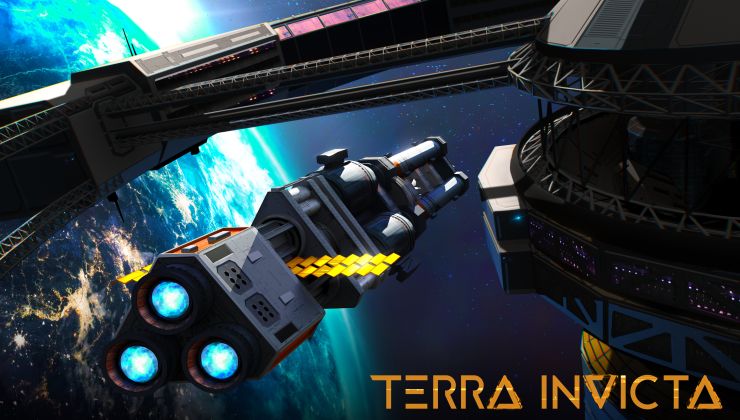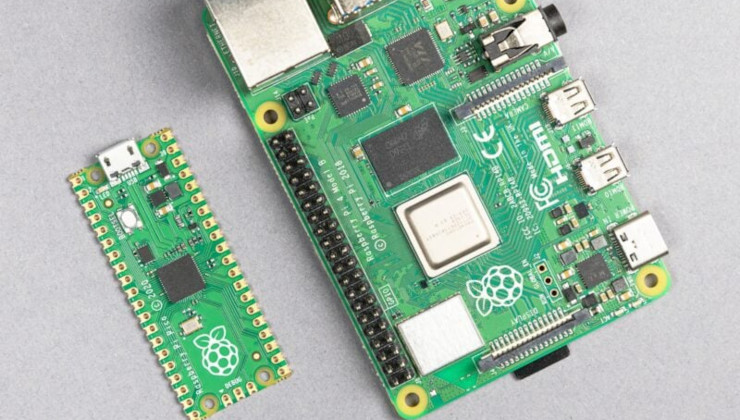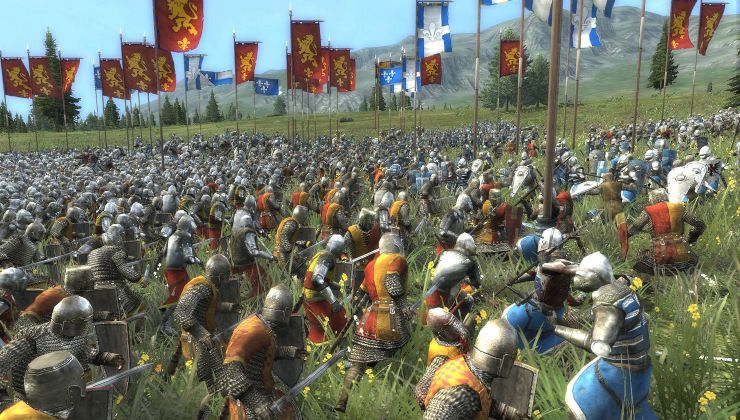Canonical are well into development on Ubuntu 24.10, the next non-LTS version of the popular Linux distribution and things keep improving for gamers.
In their latest developer update, Oliver Smith the Interim Engineering Director for Ubuntu Desktop, goes over some details that were already made in Ubuntu 24.04 like some of the fine-tuning they did to the Linux kernel that improved gaming performance.
As for what's to come, plenty of changes are planned for the Steam Snap package. This actually appeared for the first time in the recent Steam Survey for May, which shows up as "Ubuntu Core 22". Smith noted how the Steam Snap will soon get updates "with a broader range of permissions that should resolve a number of outstanding reports" that will "enable Steam to have access to the things it expects whilst still maintaining the dependency management and updated userspace driver benefits".
More changes are coming like GNOME 46.2 for Ubuntu 24.04 and there's improvements to the new Ubuntu Desktop installer. Their App Center is getting various improvements like running Snaps no longer blocking "users from using the ‘update all’ option in the management interface", supporting externally downloaded .deb files and the gaming tab will soon sort applications by their average rating by default.
Just, why do they always have to do the Not-Invented-Here thing all the time.
True, Snap supports more use cases than either Flatpak or oci, but its such a closed ecosystem that nobody else dares adopt it. So it just develops at a slower pace, and gets less testing. And sits with horrible performance for years, etc...
It's basically the reason I tell people to move off Ubuntu as their snapification of everything is really breaking things.
Frustrating that Ubuntu (Means: Working together well) is not working together.
Quoting: morbiusI tried Steam snap when I installed Ubuntu 24.04 and it worked like ass, no games would start. I replaced it with the app from Steam store and everything was fine.What is the "app from Steam store"? Downloading Steam from Steam? This might cause a singularity in the space-time continuum...
Anyway: The Snap version of Steam runs without hiccups on my laptop. The apt version had it's fair share of problems with launching the single game I play on my laptop (Hexcells).
The apt version of Steam on my desktop launches all games quite nicely BUT I always have to start Steam from a shell. Just clicking the icon which supposedly does exactly the same results (after showing the splash screen briefly) in a Steam icon in my indicators section but does nothing else. The only menu entry working is "Exit Steam".
Quoting: grigiwhy do they always have to do the Not-Invented-Here thing all the time.You are aware that most of the NIH stuff came before nowadays established alternatives?
upstart (2006) preceded systemd (2010).
Unity (2010) preceded Gnome Shell (2011).
Snap (2014) preceded Flatpak (2015).
And when Mir was announced in 2013 Wayland was a long shot from being remotely usable.
Even Bazaar (26 March 2005) came a few days before Git (7 April 2005 after a 3 day development).
supporting externally downloaded .deb filesIt still baffles me that a supposedly user-friendly distribution required you to use apt in the terminal to install .deb files until now.
Quoting: grigiJust, why do they always have to do the Not-Invented-Here thing all the time.Canonical started developing Snap before Flatpak existed.
True, Snap supports more use cases than either Flatpak or oci, but its such a closed ecosystem that nobody else dares adopt it.
Quoting: TuxeeAnd when Mir was announced in 2013 Wayland was a long shot from being remotely usable.Though notably Intel "[did] not condone or support Canonical in the course of action they have chosen":
[1]: https://www.phoronix.com/news/MTQ1NjY
[2]: https://lwn.net/Articles/566115/
Canonical always manages to annoy other stakeholders when they come up with their own stuff. Though Upstart was probably cool and generally well-liked, and Ubuntu Touch seemed nice enough.
Quoting: grigiIt's a laudable effort from Canonical to try and harden the linux desktop by using sandboxing as standard.What do your suggest for the people you tell to move off ubuntu?
Just, why do they always have to do the Not-Invented-Here thing all the time.
True, Snap supports more use cases than either Flatpak or oci, but its such a closed ecosystem that nobody else dares adopt it. So it just develops at a slower pace, and gets less testing. And sits with horrible performance for years, etc...
It's basically the reason I tell people to move off Ubuntu as their snapification of everything is really breaking things.
Frustrating that Ubuntu (Means: Working together well) is not working together.
I'm on ubuntu atm and mostly stuck with ubuntu to keep things as simple as possible for me, I was enjoying linux mint prior to that but don't like how further behind mint is with things like wayland ect
Quoting: TuxeeQuoting: grigiwhy do they always have to do the Not-Invented-Here thing all the time.You are aware that most of the NIH stuff came before nowadays established alternatives?
upstart (2006) preceded systemd (2010).
Unity (2010) preceded Gnome Shell (2011).
Snap (2014) preceded Flatpak (2015).
And when Mir was announced in 2013 Wayland was a long shot from being remotely usable.
Even Bazaar (26 March 2005) came a few days before Git (7 April 2005 after a 3 day development).
Quoting: Doktor-MandrakeI usually just do Debian, but Mint and PopOS are fine. Being behind on Wayland isn't a terrible thing, it's not 100% 'ready' yet. Much in the same way the move from GTK2 to 3 to 4 wasn't ready for a long time because so many apps hadn't been updated yet. Wayland breaks copy/paste behavior in older apps.Quoting: grigiIt's a laudable effort from Canonical to try and harden the linux desktop by using sandboxing as standard.What do your suggest for the people you tell to move off ubuntu?
Just, why do they always have to do the Not-Invented-Here thing all the time.
True, Snap supports more use cases than either Flatpak or oci, but its such a closed ecosystem that nobody else dares adopt it. So it just develops at a slower pace, and gets less testing. And sits with horrible performance for years, etc...
It's basically the reason I tell people to move off Ubuntu as their snapification of everything is really breaking things.
Frustrating that Ubuntu (Means: Working together well) is not working together.
I'm on ubuntu atm and mostly stuck with ubuntu to keep things as simple as possible for me, I was enjoying linux mint prior to that but don't like how further behind mint is with things like wayland ect
Quoting: TuxeeThere were definitely previews of Gnome-Shell long before Unity was out. Unity was literally Ubuntu's answer to Gnome-shell being weird for people. It took like 5 years to hit 3.0. Ha, I've been using gnome since .21/.22 was in the Debian repositories many moons ago... funny enough, it probably would have never existed if KDE had chosen a toolkit that was fully opensource (or just GPL) at the beginning.Quoting: grigiwhy do they always have to do the Not-Invented-Here thing all the time.You are aware that most of the NIH stuff came before nowadays established alternatives?
upstart (2006) preceded systemd (2010).
Unity (2010) preceded Gnome Shell (2011).
Snap (2014) preceded Flatpak (2015).
And when Mir was announced in 2013 Wayland was a long shot from being remotely usable.
Even Bazaar (26 March 2005) came a few days before Git (7 April 2005 after a 3 day development).
Quoting: Doktor-MandrakeI'd say stick with ubuntu if you don't have any particular problems with it. That advice applies to any distro to be honest. The only other LTS distro that isn't based off Ubuntu I could hypothetically recommend is debian, although installing it and setting it up isn't the most easy thing in the world compared to Ubuntu (especially on newer hardware). I'd say Fedora (workstation and the KDE spin at least) is the closest to Ubuntu in terms of ease of use and installation, although they aren't LTS distros so you'd have to deal with major version upgrades more often (once a year at minimum). There's also not a super easy way to set up system snapshots for recovery on Fedora at the moment (btrfs or otherwise) if you use the default partition setup, so keep that in mind, although I've gone months without having any major issues with standard updates.Quoting: grigiIt's a laudable effort from Canonical to try and harden the linux desktop by using sandboxing as standard.What do your suggest for the people you tell to move off ubuntu?
Just, why do they always have to do the Not-Invented-Here thing all the time.
True, Snap supports more use cases than either Flatpak or oci, but its such a closed ecosystem that nobody else dares adopt it. So it just develops at a slower pace, and gets less testing. And sits with horrible performance for years, etc...
It's basically the reason I tell people to move off Ubuntu as their snapification of everything is really breaking things.
Frustrating that Ubuntu (Means: Working together well) is not working together.
I'm on ubuntu atm and mostly stuck with ubuntu to keep things as simple as possible for me, I was enjoying linux mint prior to that but don't like how further behind mint is with things like wayland ect
tl;dr If it ain't broke don't fix it, and either debian or fedora depending on whether you like ubuntu lts or the interim release cycle.
Quoting: nat-worksDebian's install seems to be easier if you use their LiveCD image to boot from. It's far more similar to Ubuntu's installer. You really only need the full installer if you're doing some more refined stuff, like software raid, etc. Fedora's partitioning is horrific... Anaconda in general needs a UI expert to go through and fix...Quoting: Doktor-MandrakeI'd say stick with ubuntu if you don't have any particular problems with it. That advice applies to any distro to be honest. The only other LTS distro that isn't based off Ubuntu I could hypothetically recommend is debian, although installing it and setting it up isn't the most easy thing in the world compared to Ubuntu (especially on newer hardware). I'd say Fedora (workstation and the KDE spin at least) is the closest to Ubuntu in terms of ease of use and installation, although they aren't LTS distros so you'd have to deal with major version upgrades more often (once a year at minimum). There's also not a super easy way to set up system snapshots for recovery on Fedora at the moment (btrfs or otherwise) if you use the default partition setup, so keep that in mind, although I've gone months without having any major issues with standard updates.Quoting: grigiIt's a laudable effort from Canonical to try and harden the linux desktop by using sandboxing as standard.What do your suggest for the people you tell to move off ubuntu?
Just, why do they always have to do the Not-Invented-Here thing all the time.
True, Snap supports more use cases than either Flatpak or oci, but its such a closed ecosystem that nobody else dares adopt it. So it just develops at a slower pace, and gets less testing. And sits with horrible performance for years, etc...
It's basically the reason I tell people to move off Ubuntu as their snapification of everything is really breaking things.
Frustrating that Ubuntu (Means: Working together well) is not working together.
I'm on ubuntu atm and mostly stuck with ubuntu to keep things as simple as possible for me, I was enjoying linux mint prior to that but don't like how further behind mint is with things like wayland ect
tl;dr If it ain't broke don't fix it, and either debian or fedora depending on whether you like ubuntu lts or the interim release cycle.
Quoting: TuxeeSnap may have preceded Flatpak, but it certainly succeeded AppImage by a whooping 10 years. If they built Snap on top of AppImage Flatpak wouldn't have been popular today.Quoting: grigiwhy do they always have to do the Not-Invented-Here thing all the time.You are aware that most of the NIH stuff came before nowadays established alternatives?
upstart (2006) preceded systemd (2010).
Unity (2010) preceded Gnome Shell (2011).
Snap (2014) preceded Flatpak (2015).
And when Mir was announced in 2013 Wayland was a long shot from being remotely usable.
Even Bazaar (26 March 2005) came a few days before Git (7 April 2005 after a 3 day development).
Quoting: TuxeeI read it sets some (GPU related) environment variable that some systems don't like. So edit that or make your own starter...Quoting: morbiusI tried Steam snap when I installed Ubuntu 24.04 and it worked like ass, no games would start. I replaced it with the app from Steam store and everything was fine.What is the "app from Steam store"? Downloading Steam from Steam? This might cause a singularity in the space-time continuum...
Anyway: The Snap version of Steam runs without hiccups on my laptop. The apt version had it's fair share of problems with launching the single game I play on my laptop (Hexcells).
The apt version of Steam on my desktop launches all games quite nicely BUT I always have to start Steam from a shell. Just clicking the icon which supposedly does exactly the same results (after showing the splash screen briefly) in a Steam icon in my indicators section but does nothing else. The only menu entry working is "Exit Steam".
The consistent issue here is that Steam is already trying to sandbox games, so running Steam in another sandbox can tend to cause problems. Less so with Flatpak these days, but they did mention in a Github issue that Steam sandboxing breaks almost everytime a change is made to Snap.
Last edited by EagleDelta on 17 Jun 2024 at 6:57 pm UTC
Quoting: pleasereadthemanualNote that this is for the App Center that they introduced in 23.10, their previous app did support installing external .deb files from the GUI just fine.supporting externally downloaded .deb filesIt still baffles me that a supposedly user-friendly distribution required you to use apt in the terminal to install .deb files until now.
Quoting: slaapliedjeThere were definitely previews of Gnome-Shell long before Unity was out. Unity was literally Ubuntu's answer to Gnome-shell being weird for people.Yep, Unity was developed over the six months following Gnome Shell's first preview. Because Shell was absolute ass and unusable without extensions, and the Gnome developers wouldn't build in the necessary extension framework that would allow Canonical to keep using it.
The extension framework did eventually land, making Shell usable again, but by that time Unity had a groundswell of fans.
As usual, it baffles me that people pick on Canonical as the bad guy whenever they innovate. They're not afraid to drop things when better things come along, but they have a vision and when existing tech can't supply on that vision, they innovate. The essence of Linux, but they're constantly trashed for it.
Quoting: scaineAs usual, it baffles me that people pick on Canonical as the bad guy whenever they innovate. They're not afraid to drop things when better things come along, but they have a vision and when existing tech can't supply on that vision, they innovate. The essence of Linux, but they're constantly trashed for it.At least for me, my negative view of Canonical in recent years largely stems from how they handled Snap. The main reason I completely dropped Ubuntu (and stopped recommending it) was that they started to use Snap for pre-installed apps. I've heard that Snaps aren't too bad today, but back when they decided to force it on everyone they were slow and didn't theme correctly (at least for GTK). That's not to mention that basically every other distro has chosen Flatpak for sandboxed apps, but Canonical has forbid any official flavors to have it pre-installed.
Quoting: F.UltraI'm only speaking from experience; the last time I needed to try Ubuntu for the sake of documentation was 23.04 and I could not for the life of me figure out how to install a .deb file. When I double-clicked it, it would open up the software store and try to install the older one in Ubuntu's repositories. Maddening.Quoting: pleasereadthemanualNote that this is for the App Center that they introduced in 23.10, their previous app did support installing external .deb files from the GUI just fine.supporting externally downloaded .deb filesIt still baffles me that a supposedly user-friendly distribution required you to use apt in the terminal to install .deb files until now.










 How to setup OpenMW for modern Morrowind on Linux / SteamOS and Steam Deck
How to setup OpenMW for modern Morrowind on Linux / SteamOS and Steam Deck How to install Hollow Knight: Silksong mods on Linux, SteamOS and Steam Deck
How to install Hollow Knight: Silksong mods on Linux, SteamOS and Steam Deck